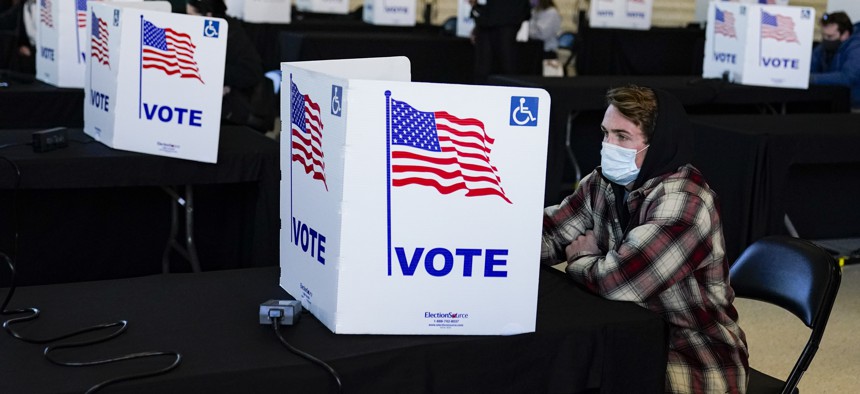Few Isolated Problems at the Polls on Mostly Smooth Election Day

A voter casts his ballot during voting at a poling place inside Bankers Life Fieldhouse on Election Day in Indianapolis, Tuesday, Nov. 3, 2020. AP Photo/Michael Conroy
In Michigan, officials worked to address misinformation spread through robocalls, while technical glitches slowed voting in some Georgia counties.
The runup to the Election Day may have been chaotic, but with more than 100 million ballots cast before polls even opened, voters who ventured out to their precincts Tuesday encountered isolated and relatively few problems.
Voting rights activists reported a smattering of issues that could crop up during any election—from malfunctioning voting machines to long lines to robocalls spreading false information.
But, despite the unusual circumstances of Tuesday’s highly anticipated election, which saw election officials ramp up early and absentee voting to prevent the spread of coronavirus, one election security official said it “just looks like any other Election Day.”
The issues that local election officials encountered early on Tuesday were quickly addressed, although experts cautioned the real test may come later when workers start counting ballots.
In Michigan, state officials worked quickly to tamp down misinformation spread by robocalls targeting Flint voters. Those false messages advised recipients of long lines at the polls, suggesting they instead vote on Wednesday (when voting will be over).
"Obviously this is false and an effort to suppress the vote," wrote Michigan Attorney General Dana Nessel on Twitter. "No long lines and today is the last day to vote. Don’t believe the lies! Have your voice heard!"
Secretary of State Jocelyn Benson issued a statement to address the misinformation campaign, reiterating that voters must be in line by 8 p.m. Tuesday to cast ballots in person.
“Lines in the area and across the state are minimal and moving quickly, and Michigan voters can feel confident that leaders across state and local government are vigilant against these kinds of attacks on their voting rights and attempts at voter suppression,” Benson said.
A senior official with the Cybersecurity and Infrastructure Security Agency said these types of robocalls are a typical occurrence during an election, but that the Federal Bureau of Investigations is looking into the source of the calls placed in Michigan and other states.
An FBI spokesperson said the bureau was aware of the robocalls but declined to comment further.
“Robocalls of this nature happen every election,” said a senior CISA official Tuesday on a call with reporters.
The official said election officials from across the country have set up communication networks allowing them to share information about misinformation campaigns or other voter issues.
While many voters embraced the expansion of early and absentee voting options made available because of the pandemic and cast ballots early, voting rights groups were still busy monitoring complaints about problems at the polls.
The Lawyers’ Committee for Civil Rights Under Law reported a smattering of issues they were monitoring early in the day, including voting machine malfunctions in some Georgia counties, polling places that opened late in Arizona and Ohio, and reports of voter intimidation in Pennsylvania.
“These are the kinds of issues that we often receive in major general elections,” said lawyers’ committee Executive Director Kristen Clarke.
In Spaulding County, Georgia, human error led to voting machine malfunctions and some voters had to wait in long lines to fill out provisional paper ballots because they could not use the machines. But by noon, Georgia’s Secretary of State’s office said the issue had been resolved.
In many parts of the country, large swaths of registered voters had already cast ballots ahead of time and those who showed up at the polls encountered short or non-existent lines and were able to cast ballots with relative ease.
In the Washington, D.C. region, local media outlet DCist reported that as of Nov. 1, 2.7 million people had cast ballots in Virginia, representing 68% of total voter turnout in the state in 2016. The 2.2 million people who cast ballots early in Maryland represent 78% of the 2016 turnout, and 283,000 ballots in Washington, D.C. represent 90% of the turnout in 2016.
Andrea Noble is a staff correspondent with Route Fifty.
NEXT STORY: Bringing DOD’s public safety communications into the 21st century





